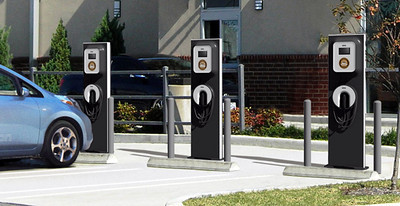There should be a Blue Rhino for Electric Cars
What if the car companies came together and come up with a standard for replaceable electric car batteries? It takes hours to charge an electric car battery. That just pretty much limits the use of an all electric car to local use for small amounts of time. It also limits the number of vehicles that could be charged at any time.

I’m starting to see charging stations around here where you can let your car charge up during the day. But it doesn’t help if you do errands all day and you are not parked in any single location. At some point, you’ll have to call it day and head home to your own charging station.
What if you could get around the charging period by using swappable batteries? You could go a gas station and they would swap out your depleted battery with one with a full charge. It would be like the “Blue Rhino” model for swapping gas grill tanks. That’s where you bring your propane tank in the hardware store, the grocery store, etc. And they give you a different one already filled. You are in and out in a few minutes and the store can service many more customers at peak times. The Blue Rhino people come in and swap the tanks with fresh ones. It’s a good model and works pretty well.

For electric car batteries, this is not a trivial problem to solve. The biggest one is that every car has a different layout for their batteries and they are not designed to be swappable. This would require major design changes for the car companies. Plus you would have to have the infrastructure to support a network of batteries. There would have to be away to easily remove the exiting battery pack and attach the new one. The filling stations could recharge the batteries overnight when the rates are lower.
If the car companies could come to a standard for the charging port (which avoided the betamaxing of the electric car market), they could come up with a standard battery pack. You could have a mix of replaceable batteries, plus a fixed set that was optimized for that car. You don’t need to have a full set of batteries to be swapped, just one large enough to go 50 miles or so. That would make it easier for car designers. They can design a rack that provides easy access via the trunk or a car, but have the rest of the car to place the other batteries.
There should be a smart network for locating battery packs. When your battery is low, the car could check for the closest filling station or car dealership that had full batteries in stock. This would take some of the fear out of running out of battery power while you are out and about. You have a smart phone app or web page show the closest station, or just add a 3G/4G radio to the car.
Someone should design a smart rack for the battery packs. This rack could charge all the battery packs, eliminating the need for someone to swap charging cables. It could also report it’s status and location to the smart battery network in real time. When your car told you that fresh batteries where at the Mobil station 2 miles down the road, that information would be current and accurate. You could also bring fresh smart racks to locations that were running low during a busy day.
This also helps with another issue that electric car owners deal with: rechargeable battery packs have a finite life span. Lithium Ion batteries typically last 3 years. By swapping batteries out, you are not stuck with a battery that’s at the end of it’s life cycle. You can have government subsidize the cost of replacement batteries or factor it in as part of the cost when you swap the batteries. Either way, you avoid financial hit at the 3 year mark.
If we could do this, I think we would see more electric cars on the road.

Comments